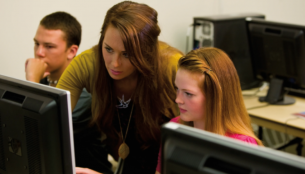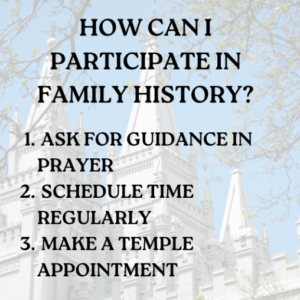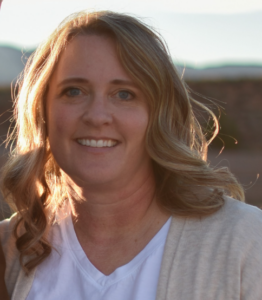Asking Big Questions

Time is at a premium these days. Between school, homework, sports, jobs, and so much more, it seems like there isn’t extra time to do something like family history work. But what if doing family history work were easy or came with a blessing? Well, it can be, and it does.
Why is family history work important?
When we do family history work, we find names of our ancestors who need temple blessings. When we find those names, we can take them to the temple so their ordinance work can be done. It is our covenant obligation as members of the Church to give those who have not heard the gospel the opportunity to receive the ordinances necessary to live with God again.
In Wilford Woodruff’s journal, he recorded a sermon in which Joseph Smith said,
“The greatest responsibility lade upon us in this life is in relation to our dead . . . for it is necessary that the seals are in our hands to seal our children & our dead for the fulness of the dispensation of times. . . . God has made provision for ev’ry spirit in the eternal world, and the spirits of our friends should be searched out & saved.”¹
Have you ever been accidentally left behind by your family somewhere? How did you feel when you were reunited with them? Now imagine how our ancestors feel when the ordinances in the temple are completed for them. They are now part of an eternal family, never to be left again. That is why we do family history work—to find those of our family who need to be brought into our eternal family through ordinances.
 Temples are built and ordinances are performed because of the importance of uniting families for eternity.
Temples are built and ordinances are performed because of the importance of uniting families for eternity.
Why should we participate in family history work?
It is our covenant obligation as members of the Church to find our ancestors, and we are uniquely suited for the work. Elder David A. Bednar taught: “You are sons and daughters of God, children of the covenant, and builders of the kingdom. . . . It is no coincidence that FamilySearch and other tools have come forth at a time when young people are so familiar with a wide range of information and communication technologies. Your fingers have been trained to text and tweet to accelerate and advance the work of the Lord—not just to communicate quickly with your friends. The skills and aptitude evident among many young people today are a preparation to contribute to the work of salvation.”²
Another reason to participate in family history work is to receive blessings for our service. We serve to help our Father in Heaven. He asks us to help our brothers and sisters, not because He isn’t able to do it Himself, but because He wants us to be blessed. Family history work is the same way. Have you ever helped someone and then felt a link between you and that person? That is a blessing of service.
Elder Bednar best described the blessings of family history work when he said, “Your testimony of and conversion to the Savior will become deep and abiding. And I promise you will be protected against the intensifying influence of the adversary. As you participate in and love this holy work, you will be safeguarded in your youth and throughout your lives.”
How can we get started?
Elder Bednar said, “I encourage you to study, to search out your ancestors, and to prepare yourselves to perform proxy baptisms in the house of the Lord for your kindred dead. And I urge you to help other people identify their family histories.”³ Here are four ways we can get started with family history work:
- We can use FamilySearch to find our ancestors who need their temple work done. As we focus on going to the temple, we will be strengthened against temptation.
- Have you ever looked at the walls of your grandparents’ homes and wondered about the people in the old photographs? Or have you been at a family dinner when everyone started telling stories? Another wonderful way to do family history is to use the FamilySearch Memories app, which you can download to your phone to record family stories.(4) When someone begins reminiscing, you can pull your phone out, tap on the app, and record the memories. Learning from our history can give us strength for our future.
- FamilySearch has another app, Get Involved, where you can review names and information found in documents to see if the indexing is correct.(5) This is something easy and fun to do, and it only takes a few minutes to complete a review of a document. It feels like a game.
- Did you know you might have relatives who were mentioned by the prophet Wilford Woodruff? The Wilford Woodruff Papers Project recently partnered with FamilySearch to create a database called Relative Finder, which connects your family tree with the 14,000 identified individuals in Wilford Woodruff’s documents. You might be surprised by what you find. Check it out here: wilfordwoodruffpapers.org/relative-finder.
How else can we participate?
Here are three suggestions:
First, we can pray about what we can do to be involved in family history work. Our Heavenly Father knows what will help us. We can ask Him and then follow through.
Second, we can schedule regular time to do family history. One idea is to substitute time on our phones playing games with time on our phones doing family history work. Family history is a perfect activity to dedicate time to on a Sunday afternoon or to use as a homework break during the week. Prioritizing family history work in our busy schedules will open the heavens.
Third, we can make appointments to take family names to the temple. Even if we don’t have any names prepared yet, we can schedule an appointment with the faith that between now and then we will be able to find names to perform ordinances for. We can rely on the Spirit to guide us as we search for our ancestors.
Wilford Woodruff taught, “Temple work for the dead was an important duty in which a good many of the Latter-Day Saints were engaged. . . . In these last days this same duty rested upon us. Our fathers who had died without a knowledge of the Gospel had gone into the spirit world, a[n]d we should labor for them here.”6
Family history is an important work which can bless our lives.
Michelle Pack graduated from Utah State University–Eastern in 1995 with an associate degree in Graphic Design. After serving in the Guatemala, Guatemala North Mission from 1996 to 1998, she continued her education at Utah Valley University, graduating in 1999 with an associate degree in Paralegal Studies and in 2000 with a bachelor’s degree in Technology Management and an emphasis in Graphic Design. She worked as a paralegal for two years before having her children and becoming a full-time stay-at-home mom. Her two children are now in college. Not wanting to let her children suffer through college alone, Michelle went back to school and is now attending Utah Tech University, working on her master’s in Technical Writing and Digital Rhetoric. Michelle loves the gospel, family history, and the temple. She and her husband enjoy camping, hiking, and spending time together. She is excited to be a volunteer with the Wilford Woodruff Papers.
Endnotes
[1] Wilford Woodruff’s Journal, April 7, 1844, The Wilford Woodruff Papers, wilfordwoodruffpapers.org/journal/1844-04-07.
[2] David A. Bednar, “The Hearts of the Children Shall Turn,” October 2011 general conference, ChurchofJesusChrist.org.
David A. Bednar, “The Hearts of the Children Shall Turn,” October 2011 general conference, ChurchofJesusChrist.org.
“FamilySearch Memories,” familysearch.org/memories-app.
[5] “FamilySearch Get Involved,” familysearch.org/getinvolved/.
[6] Discourse by Wilford Woodruff, November 13, 1892, The Wilford Woodruff Papers, wilfordwoodruffpapers.org/discourse/1892-11-13.
The Wilford Woodruff Papers Foundation’s mission is to digitally preserve and publish Wilford Woodruff’s eyewitness account of the Restoration of the gospel of Jesus Christ from 1833 to 1898. It seeks to make Wilford Woodruff’s records universally accessible to inspire all people, especially the rising generation, to study and to increase their faith in Jesus Christ. For more information, visit wilfordwoodruffpapers.org.



